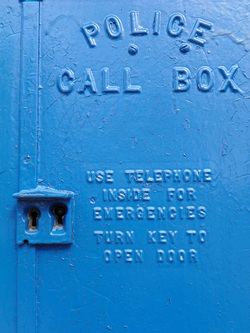
I had to explain to her why it was so important that she call the police:
Because other people looking to hire caregivers are going to look at the home-care workers' registry and look at the results of the criminal background checks, and if she doesn't file a police report about the theft, this caregiver will appear to have both a lot of experience and no problems in her background.
My friend felt uncomfortable; the caregiver is young, and my friend doesn't see herself as vindictive. Basically, she does not want to get the other person in trouble.
But of course, it's not my friend who is responsible for the trouble — the thief did that. My friend needs to report to protect others from this person and ultimately to protect herself by making sure that the system for background checks is reliable and complete. Someone who will steal from a disabled person getting 24 hour care is not someone who should be able to find work as a caregiver for other vulnerable people.
So you're not being kind by overlooking abuse or thefts like this. Consider what you're doing to the person's next victim.
My friend was also concerned that, because it would be her word against the caregiver's, she would not be able to prove that the theft occurred. I made two points about that:
- one, it's not her problem to prove the case. That is a job of the police and the district attorney, not the crime victim.
- Second, it turns out that the circumstances of the theft and what was stolen means that it is highly likely that the stolen property was fenced nearby, and it will be very memorable to whomever ended up with it -- meaning that it won't be that hard to prove that it was the stolen property in question.
The situation is the same with nonprofits. Many times when nonprofits are ripped off, the tendency among the members as to keep it quiet and not make a big fuss about it. It's also very appealing for the board to say that they were partially at fault for allowing the thief to rip them off, and therefore they don't want the bad publicity to their organization etc. etc. The big problem with this logic is the same as in my friend's case: when crime victims don't report crimes, the criminals are allowed to find new victims and victimize them, because they have no reason to know about the person's past.
So, uncomfortable as it is, if someone rips you off, don't make it your job to help them cover it up. If someone abuses you or steals from you, whether you are an individual or as part of an organization, call the police. Let the police and the court system make the decisions on prosecution and any punishment that might occur if warranted.
Bottom line: don't help criminals victimize other people by failing to report past crimes.
UPDATE: A helpful assistant attorney general points out:
"Great points, John. You might also tell your friend and others that they can call the Medicaid Fraud Unit at the Oregon Department of Justice if the care occurs at home and the provider is paid by the State, or if the theft or financial exploitation occurred in a Medicaid-funded facility [note that nearly all nursing homes and assisted living facilities accept Medicaid funding - JMG] whether or not the victim is a Medicaid recipient."
Thanks, AAG! You can reach the Medicaid Fraud Unit (MFU) at 971-673-1971.
 RSS Feed
RSS Feed
